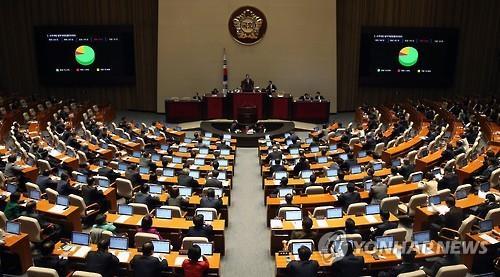With the opening of the 20th National Assembly -- where opposition parties have a majority of 300 seats -- scheduled for May 30, the business community has raised concerns over a corporate tax hike and its impact on the economy.
“A recent survey of about 50 Korean economists showed 72 percent of respondents backed the current corporate tax rate,’’ the Korea Chamber of Commerce and Industry said in a press release Monday. Of them, 12 percent called for corporate tax reduction for business vitality.

Sixteen percent of respondents, however, supported an increase in corporate tax, claiming that a tax hike is inevitable in the long term, considering growing social demand for welfare.
The nation’s biggest business association added it targeted not only progressive but also conservative economic professors for a balanced survey.
The KCCI survey indicated the keen interest of the Korean corporate world to the debate among political parties over a corporate tax hike.
The liberal main opposition Minjoo Party of Korea, which got more seats in the April 13 general election over the pro-business ruling Saenuri Party, has pushed for a tax rate hike for companies whose annual sales exceed 50 billion won ($43 million) from the current 22 percent to 25 percent.
In response to the move, the business community has claimed that the amount of taxes paid by companies is not low as compared to other OECD nations. According to the chamber, Korea’s maximum corporate tax rate, at 25 percent, was 19th highest among 34 OECD nations in 2015.
“The corporate tax hike also goes against the global trend,’’ a KCCI official said, taking the U.S. tax reform move as an example. The U.S. Congress is in talks to drastically cut the country’s 35 percent maximum corporate tax rate down to 15 percent to win back companies going abroad.
In addition to favoring a corporate tax reduction, those surveyed projected a bleak outlook for economic growth over the next five years.
About 76.9 percent of respondents said the Korean economy is expected to remain stuck below 3 percent starting this year.
The other factors that could have a negative effect on the nation‘s economy included North Korea‘s nuclear threats, fluctuations in crude oil and other raw materials, Japan’s economic slump, impact from the U.S. presidential elections, uncertainty over the eurozone economy, and conflicts involving the Islamic State.
“South Korea should disperse risks by boosting the domestic spending market through the promotion of the service industry,” Kim Seong-tae, a researcher at the Korea Development Institute, was quoted as saying by Yonhap News.
By Seo Jee-yeon (jyseo@heraldcorp.com)
“A recent survey of about 50 Korean economists showed 72 percent of respondents backed the current corporate tax rate,’’ the Korea Chamber of Commerce and Industry said in a press release Monday. Of them, 12 percent called for corporate tax reduction for business vitality.

Sixteen percent of respondents, however, supported an increase in corporate tax, claiming that a tax hike is inevitable in the long term, considering growing social demand for welfare.
The nation’s biggest business association added it targeted not only progressive but also conservative economic professors for a balanced survey.
The KCCI survey indicated the keen interest of the Korean corporate world to the debate among political parties over a corporate tax hike.
The liberal main opposition Minjoo Party of Korea, which got more seats in the April 13 general election over the pro-business ruling Saenuri Party, has pushed for a tax rate hike for companies whose annual sales exceed 50 billion won ($43 million) from the current 22 percent to 25 percent.
In response to the move, the business community has claimed that the amount of taxes paid by companies is not low as compared to other OECD nations. According to the chamber, Korea’s maximum corporate tax rate, at 25 percent, was 19th highest among 34 OECD nations in 2015.
“The corporate tax hike also goes against the global trend,’’ a KCCI official said, taking the U.S. tax reform move as an example. The U.S. Congress is in talks to drastically cut the country’s 35 percent maximum corporate tax rate down to 15 percent to win back companies going abroad.
In addition to favoring a corporate tax reduction, those surveyed projected a bleak outlook for economic growth over the next five years.
About 76.9 percent of respondents said the Korean economy is expected to remain stuck below 3 percent starting this year.
The other factors that could have a negative effect on the nation‘s economy included North Korea‘s nuclear threats, fluctuations in crude oil and other raw materials, Japan’s economic slump, impact from the U.S. presidential elections, uncertainty over the eurozone economy, and conflicts involving the Islamic State.
“South Korea should disperse risks by boosting the domestic spending market through the promotion of the service industry,” Kim Seong-tae, a researcher at the Korea Development Institute, was quoted as saying by Yonhap News.
By Seo Jee-yeon (jyseo@heraldcorp.com)







![[KH Explains] How should Korea adjust its trade defenses against Chinese EVs?](http://res.heraldm.com/phpwas/restmb_idxmake.php?idx=644&simg=/content/image/2024/04/15/20240415050562_0.jpg&u=20240415144419)










![[Today’s K-pop] Stray Kids to return soon: report](http://res.heraldm.com/phpwas/restmb_idxmake.php?idx=642&simg=/content/image/2024/04/16/20240416050713_0.jpg&u=)